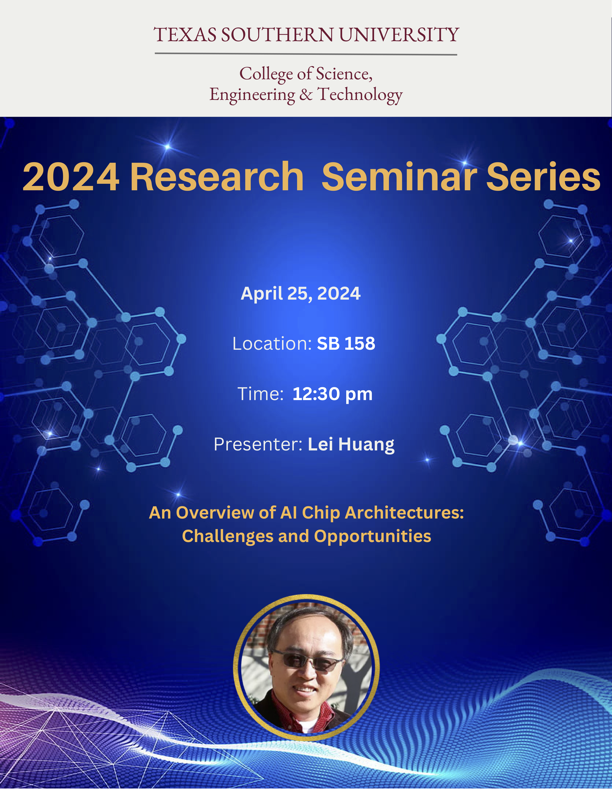or keep pressing Tab key no navigate
April 25, 2024
Location: SB 158
Time: 12:30 pm
Presenter: Lei Huang
An Overview of AI Chip Architectures: Challenges and Opportunities
Abstract:
In the modern landscape, artificial intelligence (AI) pervades our daily lives, powering virtual assistants, autonomous vehicles, and more. Yet, the underlying technology driving these innovations, AI chip architecture, remains a topic often covered in complexity. This presentation seeks to demystify AI chip architecture, offering an accessible walkthrough suitable for both beginners and professionals.
Beginning with foundational concepts, I will introduce the core principles that distinguish AI chips from traditional computing architectures, using relatable examples to illustrate their practical applications. We will then delve into the current state-of-the-art AI chip designs, including Nvidia’s high-performance GPUs, Google’s specialized TPUs, and recent advancements from industry leaders such as AMD, Intel, and other promising startups. Furthermore, we will explore emerging architectures like neuromorphic and photonic chips, discussing their potential to redefine the future of AI hardware.
Throughout the presentation, I will navigate the interdisciplinary nature of AI chip design, highlighting its intersection with fields such as computer science, electrical engineering, and mathematics. By clarifying technical terminology and demonstrating design principles, I aim to provide attendees with a comprehensive understanding of AI chip architecture, its software ecosystem, and its implications for the broader technological landscape.
Lastly, for students aspiring to enter the AI industry, I will offer advice to better prepare themselves for the exciting and collaborative nature of AI research and development in industry settings.
Lei Huang, Ph.D., is a senior technical staff member at Lightmatter, a spin-off from MIT dedicated to developing the next generation of photonic AI chips. With a background in AI, high-performance computing (HPC), and compiler technology, Dr. Huang brings extensive research experience to his current role.
Previously, Dr. Huang served as an Associate Professor in the Department of Computer Science at Prairie View A&M University (PVAMU), where he led research efforts at the Computing Research Lab. During his tenure, he also held the position of Associate Director of Research at the Center of Excellence in Research and Education for Big Military Data Intelligence, sponsored by the Department of Defense (DoD). Dr. Huang earned his Ph.D. from the Computer Science Department at the University of Houston in 2006.

Light lunch will be served.